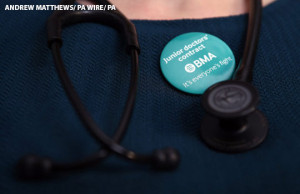 I am in a moral quandary, I am in a personal quandary, and I am in a professional quandary. I cannot answer the question “Should I strike?”
I am in a moral quandary, I am in a personal quandary, and I am in a professional quandary. I cannot answer the question “Should I strike?”
As a doctor, I’m very used to questioning, reviewing evidence, and coming to a conclusion. One of my favourite topics for discussion is bias and avoiding it every day. With regards to this contract, I don’t know what’s bias or not, I’m tired of thinking about it and I’m scared of getting the answer wrong. And I’m not alone.
The idea of a full walkout today is a level of uncertainty we have not dealt with before. Morale is low, and I don’t know anyone who is 100% convinced of what they should do. Consultant colleagues feel sorry for us and the decision we are about to make.
Am I a bad doctor if I strike for 16 hours over two days and withdraw my care? Or am I a bad doctor if I allow a contract to go through that I think would impact on patient safety in the long term?
The issue is not just the contract—this has come at a bad time. The whole system is super-stretched, and I don’t think anyone fully knows why. There’s a shortage of staff and chronic under-funding, but 20 years ago, despite fewer doctors it was different. The general consensus is there are now more patients, and there is more to do for them. My colleagues, the system, and the budget are becoming overwhelmed. I’m overwhelmed, and I can’t tell if it’s clouding my judgment.
And at a time when I regularly fear for patient safety anyway, am I going to strike—walk out of work, and leave my colleagues to it? Does that make sense to me?
And yet I keep coming back to points I cannot ignore:
Staff shortages, pay precedents for others, and discrimination.
I read Jeremy Hunt’s letter from 19 April and yes, I think many people will believe this is about Saturday pay and overtime. Maybe for some it is. But I want people to see the bigger picture. Whatever they put in the contract, we do not have the doctors available to work to those proposed conditions. And we have no trust in the safeguards that they are putting in place.
Therefore the following outcomes are possible: either we breech the contracts which will result in tired doctors making mistakes, and place extra financial penalties on the hospital (if the safeguards even work); leaving wards understaffed; or relying on other professionals (such as specialist nurses) to fill the gap. Or we have to privatise certain aspects of care.
And this is before there is a departure of staff because women can’t afford to have a family, child care, and a career, and other doctors move abroad. My colleagues and I are really worried about it. Will going part time be bad for my family? Will I have to choose between being a doctor or a mother?
Of course I want more colleagues at the weekend. I also want more at night. But we are already short of junior doctors on all the rotas I’ve worked in recent years, and therefore the contract will not solve this problem.
Please can we take a deep breath, step backwards and review the evidence for this? Why is piloting this a problem?
An article by Alex Murray (junior surgeon) reported that Jeremy Hunt said nothing would stop him imposing the contract, and so is this pointless? I don’t want any person to come to harm because junior doctors did not go to work.
I know my local department will have excellent consultants, doing everything they can. I can’t say nothing will go wrong, but I also cannot promise that on any “normal” day. Such is the nature of an unpredictable system and chance. I do understand that is not reassuring for people, and that it’s not very reassuring for me. At least I know on other days I am making all my efforts to improve the system, is that what I’ll be doing today too?
Lizzie Wortley is a paediatric registrar working in Northwest London who is interested in quality improvement, acute care, and particularly enjoys debating the psychology of doctors and patients.
Competing interests: None declared.
